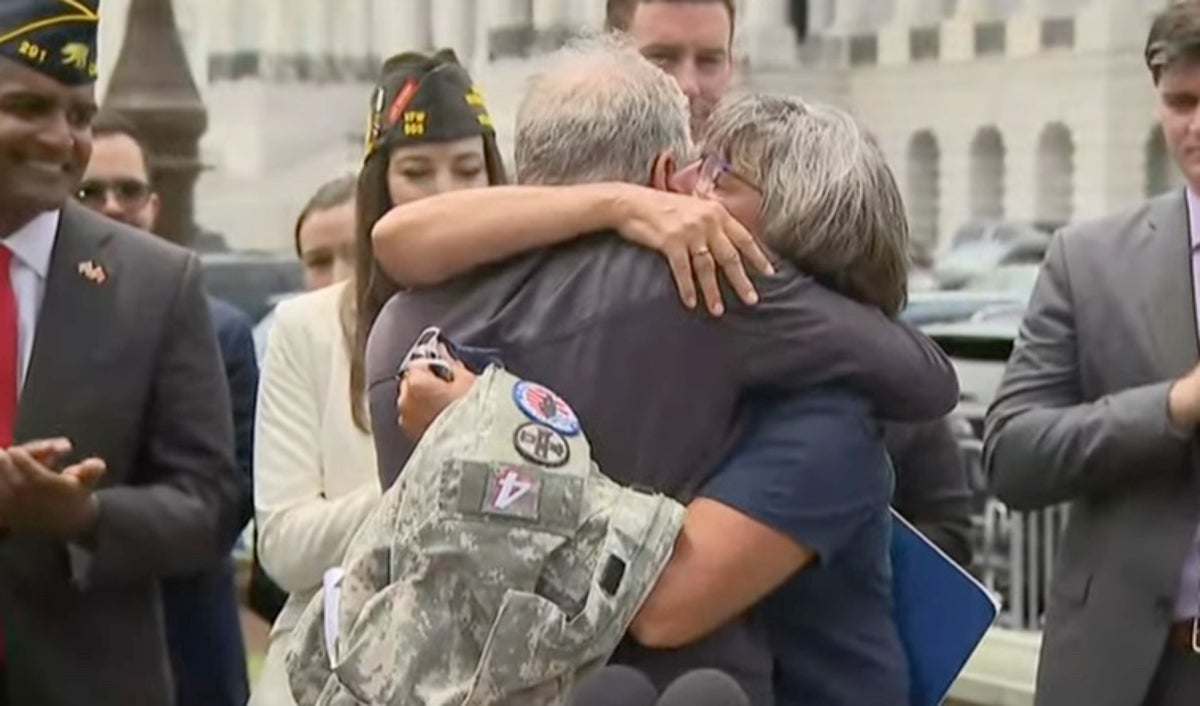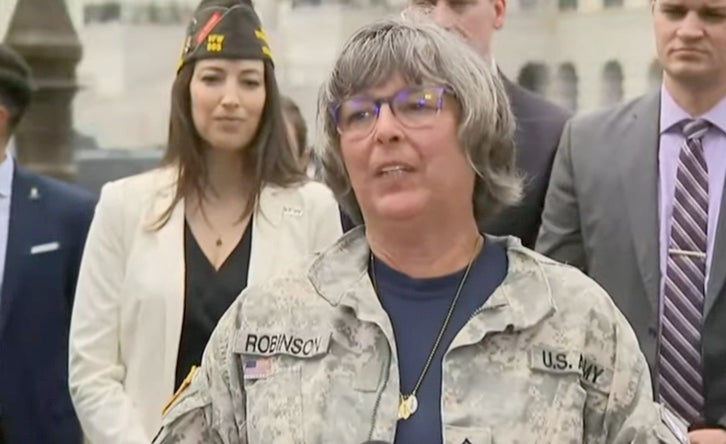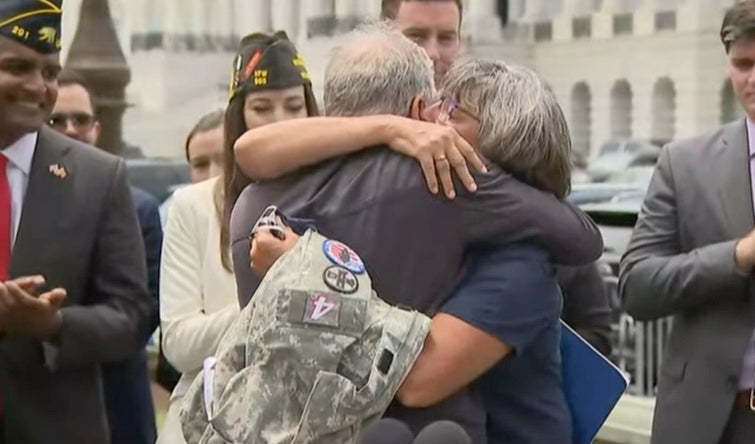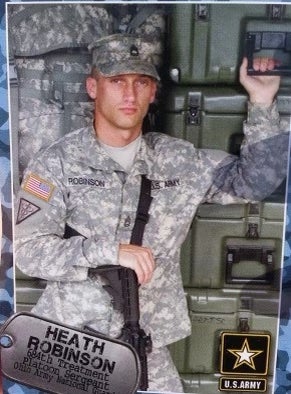
The mother-in-law of a veteran who died because of toxic exposure has said she no longer needs to “carry” him “on her shoulders” after the Senate finally passed a landmark burn pits bill.
Susan Zeier, mother-in-law of the late Sgt First Class Heath Robinson, spoke out at an emotional press conference on Capitol Hill on Thursday, moments after the SFC Heath Robinson Honoring our PACT Act sailed through the Senate with a vote of 84 to 14.
Choking back tears, Ms Zeier revealed she has been wearing her son-in-law’s army jacket for the last four years as she and other veteran advocates lobbied the US government to give service members sick and dying on their return from America’s post-9/11 wars access to the healthcare and disability benefits that they need.
Now, with the fight nearing its end, she said it was time to “retire” the jacket, symbolically taking it off.
“I’ve been wearing this since the summer of 2018 and today, with this bill passing the Senate, I think it’s time to retire it,” she said.
“I no longer have to carry Heath on my shoulders while I’m advocating for all the other veterans who are out there sick and dying.”
The bill was renamed in March after Sgt Robinson who died in May 2020 from a rare cancer caused by breathing in toxic fumes from burn pits while serving in Iraq in the Ohio National Guard in 2006 and 2007.
In 2016, he started having nosebleeds and the following year he was diagnosed with a rare autoimmune disease before receiving his cancer diagnosis soon after.
Doctors told him his cancer was caused by exposure to toxic substances.
He died in 2020 aged just 39 years old.
Two years on from his death, the bill passed on his daughter Brielle’s ninth birthday.
Ms Zeier described her son-in-law as a “wonderful father” fought his cancer “valiantly” to “survive as long as he could for his daughter”.
“It seems I’m always talking about how sick he was”, she said, saying that she instead she wanted to share “a little about Heath”.
She recounted a story around 10 years ago where they had a family reunion with about 75 people at her home.

After the celebration, she said that everyone was tired and so they decided to leave the clean up for the following day.
When she got up the next day, Ms Zeier found that her son-in-law had gotten up and cleaned the entire place on his own.
“That was the kind of person who he was. He was always helpful and generous,” she said.
“He was a wonderful father to his daughter, my granddaughter Brielle.”
The veteran’s mother-in-law – who became an advocate for all veterans after her son-in-law was diagnosed with a terminal illness – also shared a heartwrenching moment with TV host Jon Stewart who has been using his celebrity to draw attention to the cause.
Mr Stewart and the veteran’s mother-in-law both choked back tears as he described her as the “epitome of grace” for fighting for the cause knowing that it was too late to save her late son-in-law.
“Your tenacity personified and the way you carried the banner for your family and your loved ones and in their pain,” he said, pausing to compose himself.
“Advocating for a cause is a very lovely thing to do but to do that in your grief when you know that it’s not going to help your loved one... but that’s not what matters to you. It’s that no one goes through what you went through and that’s just the epitome of grace,” he said, before hugging Ms Zeier.
The nation first heard Sgt Robinson’s heartbreaking story during President Joe Biden’s State of the Union address in March where he called on Congress to pass legislation on the issue.

Sgt Robinson’s widow Danielle Robinson, who has fought for the passage of the bill so other families don’t have to go through what she did, went to the SOTU as First Lady Jill Biden’s guest.
She told The Independent back in March that it was “bittersweet” for her husband to be honoured in the bill.
“It’s an honour to him and his memory is going to live on through it but at the same time I’d rather have him alive with us,” she said.
“I can’t help but think of all the other widows who are deserving of having their loved ones named on the PACT Act.
“It’s not just about our story but all of the other widows out there fighting the battle and losing their loved ones because of toxic exposure to burn pits and it’s about all the current veterans trying to fight for the healthcare they deserve.”
Senators voted 84 to 14 in favour of passing the PACT Act on Thursday, sending it back to the House for another final vote.
All Democrats voted yes with 14 Republicans voting no. These were: Senators Burr, Crapo, Lankford, Lee, Lummis, Paul, Risch, Romney, Rounds, Shelby, Thune, Tillis, Toomey, and Tuberville.
Senators Daines and Wicker were absent from the vote.
The House has already passed the bill with a 256 to 174 vote but, following modifications in the Senate, they need to vote on it again.

That vote could take place next week with the legislation then landing on the president’s desk to sign into law soon after.
Mr Biden, who believes his son Beau Biden may have died as a result of toxic exposure to burn pits, has previously urged Congress to pass legislation to support veterans impacted by burn pits and said he will sign the bill as soon as it lands on his desk.
Under the legislation, 23 cancers, respiratory illnesses and other conditions will now be presumptively linked to a veterans’ exposure to burn pits while on deployment overseas.
This means service men and women who have returned home from serving their country and developed one of these conditions no longer have the burden of proof to connect their illness to their service.
Instead, they will be given automatic access to the healthcare and disability benefits that they need.
An estimated 3.5 million servicemembers who were exposed to burn pits and airborne toxins while serving in America’s post-9/11 wars in Iraq and Afghanistan as huge open-air pits were used to burn all waste from food packaging to human waste and military equipment on US military bases.
Thousands then returned home from deployment and developed health conditions including rare cancers, lung conditions, respiratory illnesses and toxic brain injuries caused by breathing in the toxic fumes from the pits.







